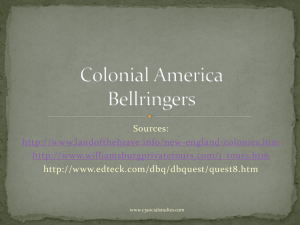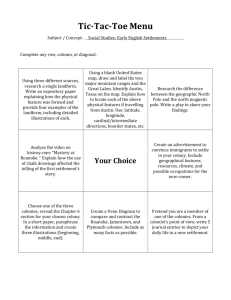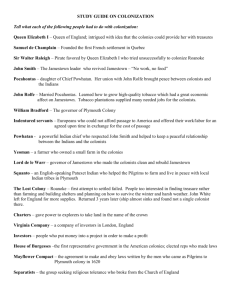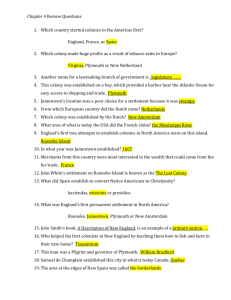Diapositiva 1
advertisement
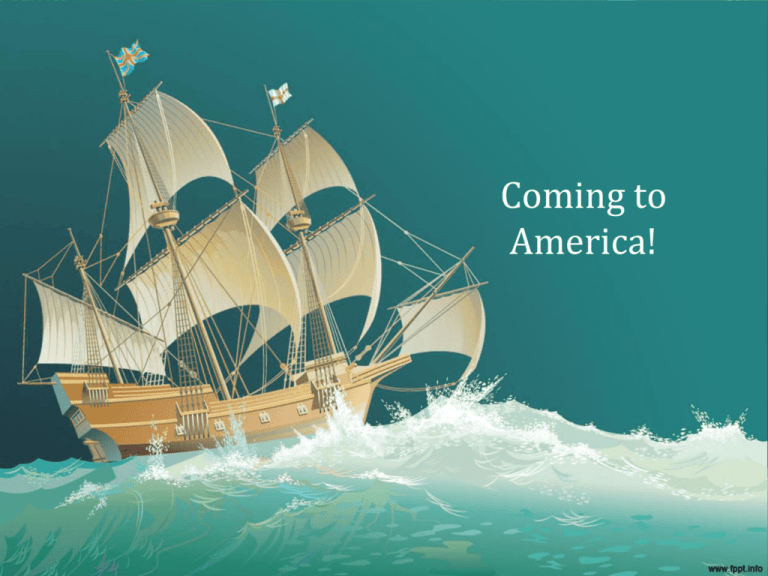
Coming to America! Do Now Today is a Day of Opportunity • What are the objectives of today’s lesson? • Why do you think these objectives are important? Physical Features of U.S. • With a partner, complete the CHALLENGE • Once complete, place this on page 8 of your INB Roanoke: The Lost Colony • Sir Walter Raleigh (English explorer) – first sees Roanoke in 1584 – Brings 2 natives back with him – Queen Elizabeth so impressed, grants open ticket to claim all lands around Roanoke Roanoke: The Lost Colony • 1585: Sends 100 men to settle Roanoke – They arrive late in season = little food supply – Leader of settlement = Ralph Lane • He is a military man, runs a tight ship – Dissatisfaction is high, men choose to leave when can • Sir Francis Drake takes them home Roanoke: The Lost Colony Let’s try this again: Trip #2 (1587) • John White = Leader – Men, women, and children – First English settler born in New World = Virginia Dare Roanoke: The Lost Colony • White called back to England – Plans to return to Roanoke immediately – Gets stuck in England for THREE YEARS!! • Returns to find no one… • http://www.history.com/videos/in-searchof-history-lost-colony-of-roanoke#insearch-of-history-lost-colony-of-roanoke Power in England Shifts • March 1603: Elizabeth I dies; James I becomes king The Virginia Company • A joint stock company tasked with settling the colony of Virginia – Charter created the company in 1606 (King James I) • What is a joint stock company? – A group of investors who believed they could make money [find gold] by moving people to America. Disney’s Portrayal • http://www.youtube.com/watch?v=xfNRR VSndA4 The Virginia Company London Company Plymouth Company Do Now • Which English explorer was highly intrigued by Roanoke and pushed for settlement? • What is the Virginia Company? Charters of Virginia • 1st Charter (1606) – King of England gives permission for companies to settle in North America • 2nd Charter (1609) – Allows the joint stock company to enforce the laws of England • 3rd Charter (1612) – Establishes additional laws for those living in America English Settlements • Council (governing body) chosen by the Virginia Company (in Britain) – Did not open documents until landed Jamestown (1607) Jamestown • First PERMANENT English colony • Leader: John Smith (not known until land) • Pros: Strategic locations, not inhabited by Native Americans • Cons: On marshland, mosquitoes, lack of fresh water Jamestown: DRAMA! • 144 men landed in Jamestown. – What were these men looking for? • Didn’t know how to farm or raise livestock. • Many refused to do manual labor. • By end of first year only 1/3 remained – Starvation, disease John Smith and Jamestown • “He who does not work, will not eat” • December 1607: Smith captured by Powhatans – Pocahontas: Relationship aided Jamestown Jamestown: STARVING! 1609-1610 • October 1609: John Smith to England – Native American relations deteriorate – Trade lacking • 440 of 500 die • Survivors seek to abandon colony – Intercepted by new governor John (#2) and Jamestown • John Rolfe – Commercialization of tobacco – Marries Pocahontas Plymouth (1620) The Pilgrims! • 2nd permanent colony • The Pilgrims or Puritans (Protestant Separatists) leave Europe in September of 1620. • 102 passengers aboard the Mayflower. Plymouth • Would not have survived if not for Squanto, a member of the Wampanoag tribe. – Taught farming, fishing, and translated We have settlements….Where go from here? • Full on COLONIES!!! • What, what?! We are here to STAY!! • Each of the original 13 was settled for a unique reason Do Now List the colonies that are a part of: 1. The Southern region 2. The Middle region 3. `The New England region Do Now • How are the economies of New England, the Middle region, and the Southern region different from one another? New England Colonies • Why they came… – Religious freedom Puritans and Pilgrims: Didn’t want to have the King as leader of church Religious Groups in Colonies • Pilgrims: Fleeing persecution in England – Sought to separate from Church of England – Mayflower Plymouth – Idea of religious freedom: To separate from Church of England • Puritans: Advocated strict religious discipline; sought to “purify” their church – John Winthrop Massachusetts Bay Colony – Idea of religious freedom: They worship to serve God in way they saw fit Middle Colonies • Why they came… – Religious freedom Quakers (tolerant, peaceful) – Economic opportunity Shipping, trading, farming, fishing Religious Groups Cont’d • Quakers: Reject formal ministry and formal ways of worship – William Penn Pennsylvania: Most tolerant of various religions Southern Colonies • Why they came… – Economic opportunity Cavaliers: Noblemen who receive land grants Plantations: large scale farms Which religious group would you have preferred to be a part of? Why? Government, represent! • Magna Carta (1215) – King John grants rights to all “freemen of our kingdom” limits his own power • Established concept of “no taxation without representation” • Established Parliament Mayflower Compact (1620): The Deets • The FIRST written framework for selfgovernment – Trying to keep people inline, not setup permanent gov’t • Mayflower passengers agreed: – To live in an organized gov’t and obey laws Mayflower Compact (1620) • Sets foundation for covenant communities – Community bound together by commitment to a governing document The Fundamental Orders of Connecticut • Considered 1st Constitution written in colonies • Aims to set up permanent gov’t that involves the people How are the Mayflower Compact and Fundamental Orders of Connecticut different from one another? How are they similar? Other Acts of Self-Government • New England: Town meetings People discussed and solved local issues • Virginia: House of Burgesses (1619) – 1st elected legislature in colonies – 12 other colonies followed suit How does the establishment of the House of Burgesses affect your life today? Stirring of Rights • Zenger Trial: Right to express yourself – 1734: Speak poorly about gov’t Go to jail – Zenger (a printer) does just that – His lawyer argues that public should have right to protest against abuses of power Wake-up, Colonies • The Great Awakening: A religious revival that encouraged people to question authority – Thought truth in Bible, not man-made laws What is going to be the impact of the Great Awakening? Posters! • You are to create an advertisement for one of the original 13 colonies. • You must include: – The name of your colony – The region your colony is in – Economic, social, and political factors that would make someone want to live there. NOT GUILTY!! • Zenger Trial promotes idea that press should have right to print truth EVEN if that means saying something bad about gov’t Albany Plan of Union • Ben Franklin: The colonies should ban together for self defense • …We should be like the Iroquois and have a confederation • Parliament: Uh…we don’t think so. – We don’t want to have our authority threatened Tolerance (?) • Act of Religious Toleration (1649) – Maryland passes • Catholics and Protestants had not been getting along – No Christian could be “troubled” because s/he is practicing own religion – Did NOT apply to non-Christians House of Burgesses • Main order of business was to make laws and oversee taxes • Has operated non-stop since 1619 – Today it is known as the VA General Assembly


